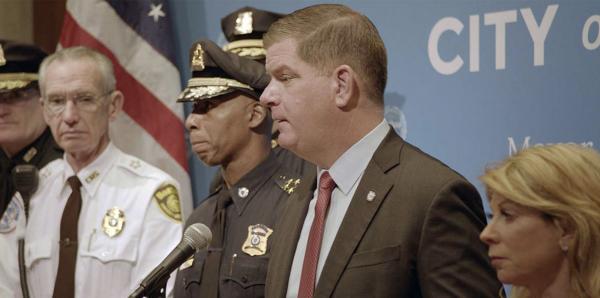Recapping the 2020 Montreal International Documentary Film Festival (Virtual Edition)

One of the last film festivals that I cover every year, the Montreal International Documentary Festival (RIDM) happens to be the one that I look forward to the most. There are some cinephiles that don’t connect with documentaries, however, for me they are a source of entertainment and enlightenment on topics that shape our social space today. Running from Nov. 12 to Dec. 2, this year’s 23rd edition of the festival offered different thematic weeks all throughout and highlighted some great films to put on my best of year list.
City Hall from director Frederick Wiseman was a part of the Seeking Communities theme of week one and was the first film that I was eagerly anticipating, despite not knowing the runtime. Clocking in at just over 4 hours and 32 minutes, this is one of the longest films I have seen this year, and possibly in my lifetime. However, it is an important one even though some of the dry subject matter of the film is about civil servants, the government of Boston, and town hall events that might not be of interest to everyone. Wiseman also focuses on ethnic, climate and housing issues in Boston and chooses a chronicle approach with a look through the camera at the mayor of Boston Marty Walsh, who is the strong symbol of Boston Strong throughout the film. Through these ideas, Wiseman shows that even uncertainty in Washington does not dictate the positive changes that can be made in Boston’s communities. There are some great community moments from the citizens at town hall events but also a mayor who never leaves the constituents who elected him as he discusses all issues and ideas. Unlike some other political figures, Mayor Walsh makes a candid point to discuss gun violence on film, making this one of the best scenes of the year for me. If you haven’t seen this film and have the time to divide the length into parts, definitely check out one of my favourite documentaries of the year.
My next documentary selection comes from the second week’s theme Contemplating Dystopia. Documentaries have the power to examine historical moments in time and reconcile with the aftermath of events. This can be said about Me and the Cult Leader from director Atsushi Sakahara. As a victim and survivor of the Aum Shinrikyo (also known as Aleph) cult’s 1995 sarin gas attack in the Tokyo subway, Sakahara decides to meet up with Araki Hiroshi. He is the current spokesperson of the cult and Sakahara turns the documentary into a road trip where both men visit their respective hometowns. There are some quiet introspective moments and tough questions shared between these two men who develop a bond during their travels.
Sakahara’s style can be seen as a parallel to the documentary filmmaking methods of Michael Moore, in regards to getting those human moments through tough questions. An example would be how both men want to reconcile with the past, including Hiroshi meeting Sakahara’s parents, and Sakahara convincing Hiroshi to connect with his parents. The film comes to a powerful climactic ending when Sakahara and Hiroshi revisit the site of the attack with a media presence where both men reconcile with the aftermath of the attacks all these years later. Me and the Cult Leader is a powerful documentary that takes on the lens of reconciling with past historical events.
The third week’s theme was Redefining Intimacy. Director Kazuhiro Soda follows up with his latest film Seishin 0 (Zero), a sequel to his 2008 film Mental. The first half of the documentary checks in once again with Dr. Yamamoto’s psychiatric clinic, as he must help his patients while dealing with the struggles of his own retirement. The second part of the film follows Dr. Yamamoto in his private life as he cares for his wife who suffers from dementia as he also grapples with the notions of getting older. Having not seen the previous film, Soda reminds the audience of the personal work and human connections that Dr. Yamamoto has had with his patients and also his life’s work in mental health. The second half is a coda of personal reflection of his work that has some heartfelt moments between Dr. Yamamoto and his wife who helped him through his career of caring for his patients.
Finally, another film that was brought to my attention in the Redefining Intimacy thematic week was the animated short film from director Robin McKenna, Thanadoula. The short story follows Natalie and her desire to become an end-of-life care giver. Thanadoula takes on a personal approach for Natalie as a meditative experience, as a way of feeling closer to her sister that has passed away. Through photographs and animation videos that are superimposed on the screen the film finds its core thematics about grief, loss, care and compassion through poetic meditation. The film will be made available soon online through the National Film Board of Canada.
Just like any good film there are the conversations that happen after viewing them between audience members. This is as important with this year’s RIDM festival, as it showcases documentary films that are topical to our ever-evolving society. Here’s hoping that the conversations resume between cinephiles of documentary films in the 24th edition of RIDM when the theatre venues open again next year.
Remi and Danny host At The Movies, which can be heard every Tuesday morning from 8:00 - 9:00AM. Tune in for discussions about movies, soundtracks, and iconic film scores. At The Movies also covers film festivals that are located in Montreal.




